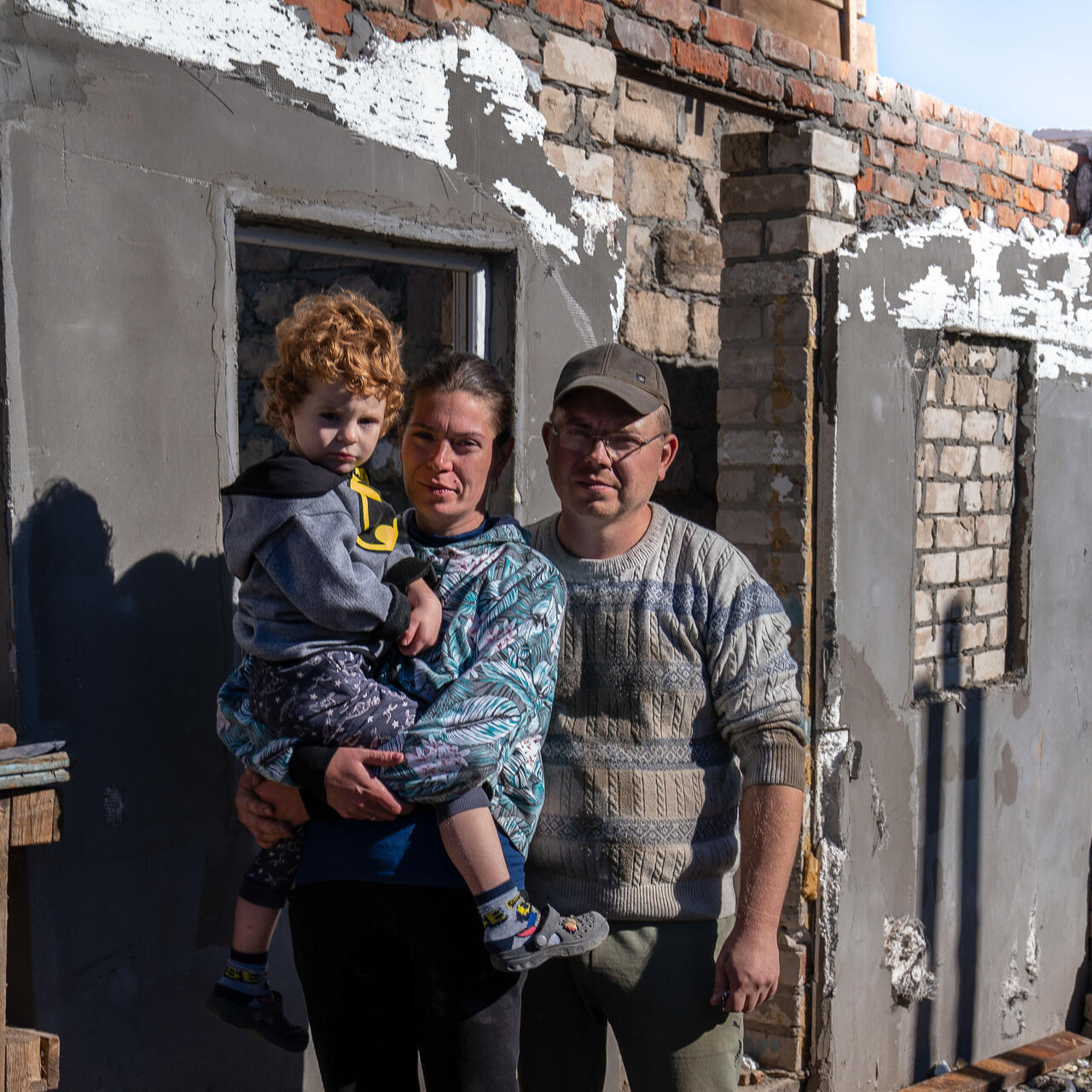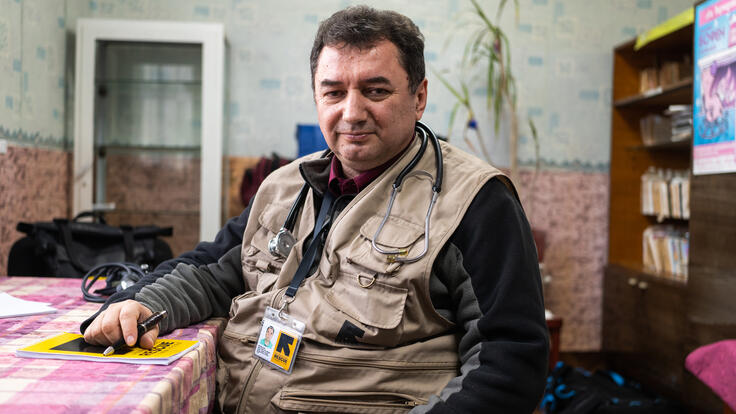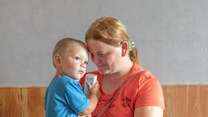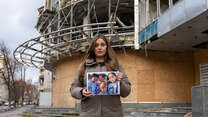Ukraine marks 1000 days of war
- Recent waves of indiscriminate attacks rock Ukraine as the country marks 1000 days of war.
- With temperatures dropping to below freezing, the destruction of residential buildings has left many without safe shelter.
- The IRC is providing aid to affected families, delivering emergency supplies and offering critical financial support.
Millions of people have been uprooted from their homes in Ukraine and are in need of humanitarian assistance in what has become the largest and fastest displacement crisis since World War II. Of these, over 6 million have fled to neighbouring countries as refugees, and millions more people displaced within Ukraine are also in need of urgent humanitarian assistance. Many are stranded or are unable to leave Ukraine due to increasing violence, destruction of bridges and roads, as well as lack of resources or information on where to find safety and accommodation.
The conflict in Ukraine escalated into a war on 24 February 2022. Bombs and shelling continue, damaging homes, hospitals, schools and other civilian infrastructure.
Some 5.4 million people are displaced inside Ukraine, while over 8 million have fled to neighboring countries to seek safety.
Ukraine, which became an independent country in 1991 after the collapse of the Soviet Union, has been working to forge closer ties with the European Union and with NATO, which escalated the tensions with Russia. In 2014, Russia illegally annexed the Crimean Peninsula and began backing pro-Russian separatists in parts of eastern Ukraine. Eight years of fighting have resulted in the deaths of over 3,000 people, forced more than 850,000 people from their homes, and left almost 3 million in need of aid. Eight years later, the conflict escalated into a war.
Russia’s war on Ukraine has resulted in humanitarian suffering on a scale beyond what Europe has seen this century. The world is bearing witness to the deaths of innocent civilians, the destruction of vital infrastructure, and massive displacement within Ukraine and beyond.
As the attacks continue, people who remain in Ukraine are enduring the dangers of life under siege, as they try to cope without adequate water, heat and electricity. Ukraine’s cold winter months exacerbated humanitarian needs in the country as families tried to keep warm without access to heating while temperatures regularly dropped below freezing. Meanwhile, constant shelling hindered access to food and medical assistance.
“As we are visiting remote areas in the region which have returned under the control of the Government of Ukraine, we witness harrowing images of destruction and talk to people who have lived for over a year without access to heating or electricity, sheltering in their basements when the crossfire came close to home,” explains Bob Kitchen, who traveled to Ukraine in early April. “A family we saw in one of the villages yesterday was once faced with a heartbreaking choice – taking their bedridden mother underground where she may have died from cold, or hoping she would survive rounds of shelling in her own bed.”
Millions of people in Ukraine have been uprooted from their homes, among them over 8 million who have fled to neighboring countries. The majority of those on the move are women and children, who are always most at risk of exploitation and abuse during crises.
The war has weakened Ukraine's infrastructure and sent the country's economy into drastic decline. Hospitals and ambulances have been attacked, with damages to the health sector estimated at $2.5 billion and rising. The Ukrainian health system was already fragile, having been heavily impacted by the COVID-19 pandemic. Tens of thousands of women will give birth in the coming months in Ukraine—many of them without access to critical maternal health care if the crisis continues to shut down essential services. Millions of people are struggling with war-compounded trauma without adequate mental-health support available.
The IRC's experience shows that when people are trapped and health and sanitation facilities are targeted, diseases like tuberculosis spread and preventable deaths skyrocket.
Beyond Ukraine
The war will also have far-reaching humanitarian implications across Europe and the globe, destabilizing the continent, and straining the resources of Ukraine’s neighbors. It also impacts supplies of Ukrainian-grown wheat and other food staples for countries like Yemen, Libya and Lebanon that are already facing acute levels of food insecurity.
Read the IRC’s statement on the Black Sea Grain Deal, which impacts some of the world’s most vulnerable countries.
Russia's invasion of Ukraine has resulted in one of the world’s largest refugee crises and the war continues to force people—most of them women, girls and the elderly—to flee across borders to Poland, Moldova and other European states. Women and girls, especially those traveling alone, could be at risk of exploitation and abuse, including sexual violence, gender-based violence and trafficking.
Over 8 million refugees have had to leave their homes in Ukraine since February 24, many of them seeking safety in Poland. Today, there are over 1.5 million refugees from Ukraine registered in Poland.
People continue to arrive at Ukraine’s borders with Poland, Romania, Hungary, Slovakia and Moldova. While basic humanitarian needs, like food and protection, are largely being met, additional integration support, such as job opportunities, long-term accommodation and language classes, are needed to help refugees rebuild their livelihoods.
In Ukraine, we are focusing our assistance in the areas most heavily affected by the conflict. Together with our local partners, we are:
- Providing timely cash support to vulnerable families to enable them to cover their most basic needs,
- Supplying hygiene kits, dignity kits for women and adolescent girls, and psychosocial support kits for children,
- Providing essential protection services, including running Safe Healing and Learning Spaces for children, gender-based violence services and women’s centers, and legal assistance for people whose homes have been damaged by air strikes,
- Supporting overwhelmed health facilities with much needed supplies and mobile health teams.
A grant by Google.org and a Google.org Fellowship team is helping the IRC support United for Ukraine, an information portal and civil society effort that helps displaced people find access to critical services. The initiative is part of the IRC’s Signpost Project, a global humanitarian technology program operating in 15 countries that helps refugees find resources to meet their urgent needs.
The IRC is also on the ground in Poland, working with local organizations to meet the needs of displaced families, many of whom are staying in shelters across the country. This includes:
- Running two livelihood centers in Poznań and Katowice together with daycare programs for children to support job-seeking parents,
- Providing newly arrived refugees with information on their rights and available assistance, as well as in-person and remote mental health support from trained psychologists,
- Running Safe Healing and Learning Spaces across refugee shelters in Warsaw, which provide children and adolescents the space they need to recover from trauma,
- Providing cultural assistants to help children integrate into classrooms,
- Delivering multipurpose cash assistance to ensure refugees can buy food, medicine, clothing and other essentials,
- Providing sign language translation for Deaf people forced to flee Ukraine,
- Continuing to support women affected by the war in Ukraine to find shelter in carefully curated safe havens.
In Moldova, we are working with local partners to assist Ukrainian refugees by supporting their education, health, safety, access to legal information and economic well-being. This includes:
- Helping children integrate into local schools by ensuring access to Healing Classrooms, tutoring services and community-led and after-school activities,
- Providing referrals for medical services, supply connections, vouchers for services, support and knowledge to displaced people in need of medical or health assistance,
- Addressing immediate protection concerns and ensuring people are safe accessing services in Moldova – this includes running safe spaces for displaced women, children and families,
- Providing mental health and psychosocial support.
The IRC is responding along the entire arc of the crisis, assisting Ukrainian refugees in Romania, Hungary, Slovakia, Czechia and Bulgaria, as well as in Germany, Italy, Greece, the US and the UK.
Learn more about the IRC's Ukraine response and how we respond to emergencies.
Download our Ukraine crisis resource FAQ sheet for people affected by the conflict who are seeking assistance in Ukraine and neighboring countries.
3.5 million+
Ukrainians reached by the IRC and our partners since February 2022, providing critical support and information to protect safety and human rights
97%
97% of our 450 colleagues are Ukrainians
Learn how the IRC mobile medical team, headed by Dr. Oleg, are reaching people with critical care across Ukraine.
Learn more100,000
IRC mobile health units have provided over 100,000 consultations to more than 15,000 patients inside Ukraine since the war escalated in Feburary 2022
To support overwhelmed health facilities, we supply critical resources and deploy mobile health teams.



